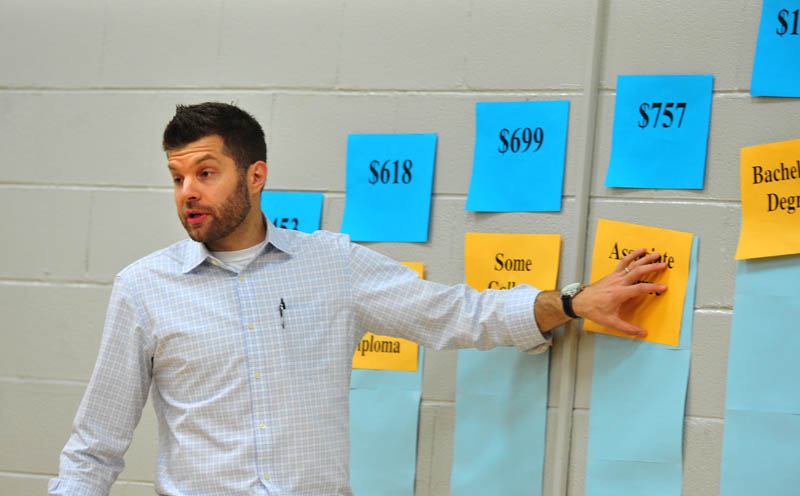“Now I know what my mom means when she says, ‘This will break me.’” This remark by a student participant in the first year of the Reality Store has stuck with Jesse Pitt, the 6th grade counselor at the Asheville Middle School. He has been running a reality store for students for five years now. “Not quite long enough to have any kids come back and tell me I made a difference, but it is getting close to that,” said Pitt.
The reality store is like a game of life, shrunk into a one-day workshop. At AMS’ recent one, about 275 pre-teen students walked in the door and were randomly assigned incomes and children. Make-believe salaries ranged from $1,300 to $1,600 per month, and each family had anywhere from none to four children. One catch — all were single parents. The rules are simple, yet challenging for some kids: Each child must have a separate bedroom, the “parent” has to keep within the allowed budget for rent, child care, water, medical insurance and vehicle costs. Tables were set up for each expense item with fictional companies like Pisgah Cable, Asheville Water and Mountain Properties.
Students seemed a little amazed that you have to pay for a lot of things they had never considered before. “Car insurance? You have to pay for that?” said one student.
Pitt has seen this before: “The hardest thing for many students is determining the difference between wants and needs.” And when the money is gone, there is always the bank, played by Mr. Pitt, who is happy to lend money at 20 percent, but only to students who already have gone through a part-time job too.
“OK,” said Pitt to a student mother of four with a $1,300-per-month income, and a part-time job of $400. “I see you just got hit with a $200 doctor bill. I can loan you $1,000, but at 20 percent interest. Do the math for me: How much will you have to pay back?”
The student replied, “Dang! That’s a lot. I want to be a banker.”
Student looking for a loan from the ‘bank,’ 6th grade counselor Jesse Pitt of Asheville Middle School. The school has an annual ‘reality store’ which simulates real life for students. Photo by Bill Rhodes
At the end of the session, there was a demonstration of average salaries and educational levels. Students had to match incomes with educational progress. The message? if you want to earn more, you have to learn more.
The school is looking at expanding this one-day event to the 7th and 8th grade students soon.




“each family had anywhere from none to four children. One catch